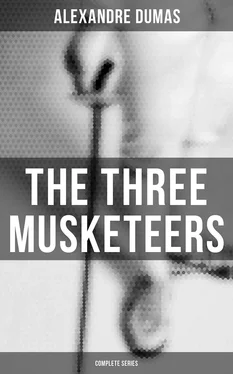“Is that monsieur?” said D’Artagnan to himself. “Oh! oh! he has grown a good deal, it seems to me.” And he sat down in the hall, choosing a conspicuous place.
The hostess, as she entered, saw D’Artagnan and uttered a little cry, whereupon D’Artagnan, judging that he had been recognized, rose, ran to her and embraced her tenderly. The Swiss, with an air of stupefaction, looked at the hostess, who turned pale.
“Ah, it is you, monsieur! What do you want of me?” she asked, in great distress.
“Is monsieur your cousin? Is monsieur your brother?” said D’Artagnan, not in the slightest degree embarrassed in the role he was playing. And without waiting for her reply he threw himself into the arms of the Helvetian, who received him with great coldness.
“Who is that man?” he asked.
The hostess replied only by gasps.
“Who is that Swiss?” asked D’Artagnan.
“Monsieur is going to marry me,” replied the hostess, between two gasps.
“Your husband, then, is at last dead?”
“How does that concern you?” replied the Swiss.
“It concerns me much,” said D’Artagnan, “since you cannot marry madame without my consent and since——”
“And since?” asked the Swiss.
“And since—I do not give it,” said the musketeer.
The Swiss became as purple as a peony. He wore his elegant uniform, D’Artagnan was wrapped in a sort of gray cloak; the Swiss was six feet high, D’Artagnan was hardly more than five; the Swiss considered himself on his own ground and regarded D’Artagnan as an intruder.
“Will you go away from here?” demanded the Swiss, stamping violently, like a man who begins to be seriously angry.
“I? By no means!” said D’Artagnan.
“Some one must go for help,” said a lad, who could not comprehend that this little man should make a stand against that other man, who was so large.
D’Artagnan, with a sudden accession of wrath, seized the lad by the ear and led him apart, with the injunction:
“Stay you where you are and don’t you stir, or I will pull this ear off. As for you, illustrious descendant of William Tell, you will straightway get together your clothes which are in my room and which annoy me, and go out quickly to another lodging.”
The Swiss began to laugh boisterously. “I go out?” he said. “And why?”
“Ah, very well!” said D’Artagnan; “I see that you understand French. Come then, and take a turn with me and I will explain.”
The hostess, who knew D’Artagnan’s skill with the sword, began to weep and tear her hair. D’Artagnan turned toward her, saying, “Then send him away, madame.”
“Pooh!” said the Swiss, who had needed a little time to take in D’Artagnan’s proposal, “pooh! who are you, in the first place, to ask me to take a turn with you?”
“I am lieutenant in his majesty’s musketeers,” said D’Artagnan, “and consequently your superior in everything; only, as the question now is not of rank, but of quarters—you know the custom—come and seek for yours; the first to return will recover his chamber.”
D’Artagnan led away the Swiss in spite of lamentations on the part of the hostess, who in reality found her heart inclining toward her former lover, though she would not have been sorry to give a lesson to that haughty musketeer who had affronted her by the refusal of her hand.
It was night when the two adversaries reached the field of battle. D’Artagnan politely begged the Swiss to yield to him the disputed chamber; the Swiss refused by shaking his head, and drew his sword.
“Then you will lie here,” said D’Artagnan. “It is a wretched bed, but that is not my fault, and it is you who have chosen it.” With these words he drew in his turn and crossed swords with his adversary.
He had to contend against a strong wrist, but his agility was superior to all force. The Swiss received two wounds and was not aware of it, by reason of the cold; but suddenly feebleness, occasioned by loss of blood, obliged him to sit down.
“There!” said: D’Artagnan, “what did I tell you? Fortunately, you won’t be laid up more than a fortnight. Remain here and I will send you your clothes by the boy. Good-by! Oh, by the way, you’d better take lodging in the Rue Montorgueil at the Chat Qui Pelote. You will be well fed there, if the hostess remains the same. Adieu.”
Thereupon he returned in a lively mood to his room and sent to the Swiss the things that belonged to him. The boy found him sitting where D’Artagnan had left him, still overwhelmed by the coolness of his adversary.
The boy, the hostess, and all the house had the same regard for D’Artagnan that one would have for Hercules should he return to earth to repeat his twelve labors.
But when he was alone with the hostess he said: “Now, pretty Madeleine, you know the difference between a Swiss and a gentleman. As for you, you have acted like a barmaid. So much the worse for you, for by such conduct you have lost my esteem and my patronage. I have driven away the Swiss to humiliate you, but I shall lodge here no longer. I will not sleep where I must scorn. Ho, there, boy! Have my valise carried to the Muid d’Amour, Rue des Bourdonnais. Adieu, madame.”
In saying these words D’Artagnan appeared at the same time majestic and grieved. The hostess threw herself at his feet, asked his pardon and held him back with a sweet violence. What more need be said? The spit turned, the stove roared, the pretty Madeleine wept; D’Artagnan felt himself invaded by hunger, cold and love. He pardoned, and having pardoned he remained.
And this explains how D’Artagnan had quarters in the Rue Tiquetonne, at the Hotel de la Chevrette.
D’Artagnan then returned home in thoughtful mood, finding a somewhat lively pleasure in carrying Mazarin’s bag of money and thinking of that fine diamond which he had once called his own and which he had seen on the minister’s finger that night.
“Should that diamond ever fall into my hands again,” he reflected, “I would turn it at once into money; I would buy with the proceeds certain lands around my father’s chateau, which is a pretty place, well enough, but with no land to it at all, except a garden about the size of the Cemetery des Innocents; and I should wait in all my glory till some rich heiress, attracted by my good looks, rode along to marry me. Then I should like to have three sons; I should make the first a nobleman, like Athos; the second a good soldier, like Porthos; the third an excellent abbe, like Aramis. Faith! that would be a far better life than I lead now; but Monsieur Mazarin is a mean wretch, who won’t dispossess himself of his diamond in my favor.”
On entering the Rue Tiquetonne he heard a tremendous noise and found a dense crowd near the house.
“Oho!” said he, “is the hotel on fire?” On approaching the hotel of the Roe he found, however, that it was in front of the next house the mob was collected. The people were shouting and running about with torches. By the light of one of these torches D’Artagnan perceived men in uniform.
He asked what was going on.
He was told that twenty citizens, headed by one man, had attacked a carriage which was escorted by a troop of the cardinal’s bodyguard; but a reinforcement having come up, the assailants had been put to flight and the leader had taken refuge in the hotel next to his lodgings; the house was now being searched.
In his youth D’Artagnan had often headed the bourgeoisie against the military, but he was cured of all those hot-headed propensities; besides, he had the cardinal’s hundred pistoles in his pocket, so he went into the hotel without a word. There he found Madeleine alarmed for his safety and anxious to tell him all the events of the evening, but he cut her short by ordering her to put his supper in his room and give him with it a bottle of good Burgundy.
Читать дальше












